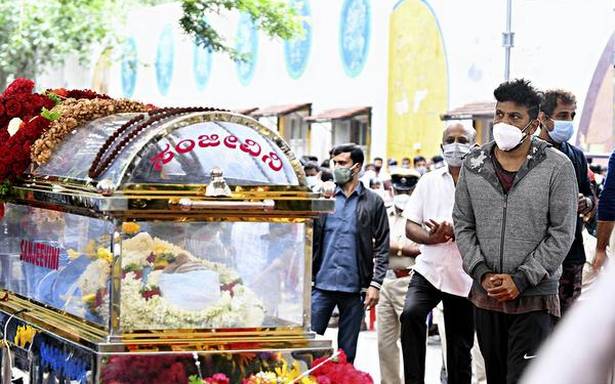But the number is still way below pre-COVID-19 days
Although cadaveric organ donations had almost come to a halt during the first year of the pandemic in 2020, there is a slight improvement this year. However, the number of donations are still way below those that happened during the pre-COVID-19 days.
While over 5,000 patients are waiting for various organ transplants in Karnataka, there have been hardly 61 cadaveric donations since last year. This is apart from one skin donation.
Jeevasarthakathe, the State Organ and Tissue Transplant Organisation (SOTTO), which is the nodal agency that facilitates cadaver organ donations, recorded 35 donations in 2020, retrieving 100 organs, while the State’s only skin bank in Victoria Hospital got just one donation. This year, 26 cadaveric donations have been recorded retrieving 65 organs so far.
During the corresponding period in 2019, while 105 cadaveric donations were facilitated through Jeevasarthakathe (wherein 511 organs were retrieved) the skin bank had seen 40 donations. This has created a huge demand-supply gap in organ transplantation in the State.
Jeevasarthakathe Chief Transplant Coordinator Lijamol Joseph, who attributed the poor donations to the fear of COVID-19, said many families were hesitant to allow a virus test to be conducted on the cadaver. “Also, their main concern is that the procedures that need to be followed before harvesting the organs are time consuming. Due to this, the handing over of the body to the family gets delayed. In actor Sanchari Vijay’s case there was total cooperation from all authorities including the police and hence the procedures were expedited,” she told The Hindu.
Hesitant recipients
Ms. Joseph pointed out that the fear of COVID-19 has also made some organ recipients hesitant to undergo transplants. “At least five eligible recipients enrolled with us, who were contacted to come for pre-transplant tests, refused to take it up and said they will continue with medical management for some more time,” she said.
“Although there are various tests done before the organs are retrieved, the pandemic has made us extra cautious. While the patient would have undergone an RT-PCR test once he/she is brought to the hospital, we check the viability of the organs by taking the opinion of various organ advisory committees before retrieving the organs. The fear of infection should not make recipients hesitant to undergo transplants,” she asserted.
Sudarshan Ballal, Chairman, Manipal Hospitals, and member of the State’s COVID-19 expert committee, said there could be many reasons for the poor donations. “As the healthcare system, especially the ICUs have been overwhelmed by COVID-19 patients, other sick patients may not have been able to get admitted to the hospitals. Overall, organ donations have reduced to 20% of those that were recorded during pre-COVID days,” he said.
“The fear of COVID-19 and the higher risk of developing any other infections in transplant patients are the main reasons why the transplant numbers have come down during the pandemic,” he said.
“The pandemic has not only affected a large number of patients infected by COVID-19 but unfortunately has also seriously hit the healthcare delivery of non-COVID-19 related illnesses like kidney disease, cancer and non-communicable diseases. Our future healthcare strategies should make sure that we are able to take care of both pandemic and non-pandemic related illnesses simultaneously because every life is important,” he added.
Actor’s organs give new lease of life to many
Kannada actor ‘Sanchari’ Vijay’s organ donation is the 26th this year. His vital organs – kidneys, liver, heart valves and corneas – gave a new lease of life to many waiting patients. While one of his kidneys and his liver were transplanted in two patients in Apollo Hospital, where the organs were retrieved, the other kidney was given to M.S. Ramaiah Hospital, heart valves to Sri Jayadeva Institute of Cardiovascular Sciences, and corneas to Minto Eye Bank.
Source: Read Full Article

